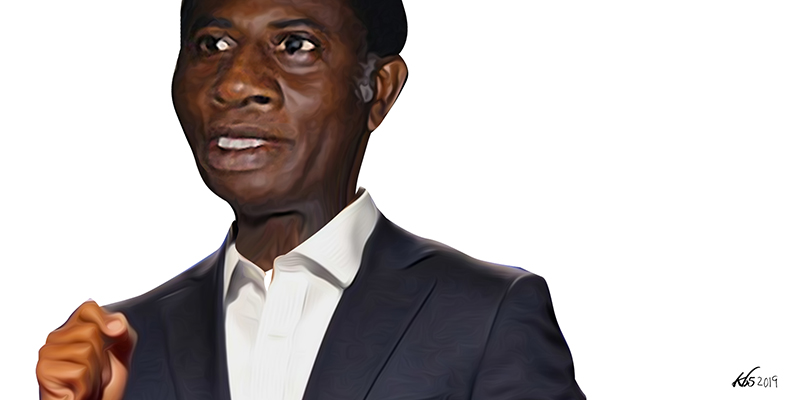In “Conceptual Decolonisation: Kwasi Wiredu’s Disruption of Philosophy”, published in The Elephant on 25th April 2019, Sanya Osha argues that while the celebrated Ghanaian philosopher, Kwasi Wiredu, has disrupted Western philosophy, his efforts at conceptual decolonisation within the framework of analytic philosophy are not radical enough because, allegedly, they remain captive to the Western philosophical canon. Osha has pursued the same line of argument in his article on Wiredu in the Internet Encyclopedia of Philosophy.
It is appropriate to remind ourselves early in this article that since colonisation denotes foreign invasion and occupation that robs its victims of their political autonomy, material resources, and their attendant right to cultural expression in its diverse manifestations, conceptual decolonisation necessarily implies the victims’ initiative to evict foreign ideas that occupy and dominate their way of thinking, and to assert their right to think and act as they choose. Scholars have frequently observed that colonisation had a three-pronged approach: military action to physically subdue the armed resistance of its victims, religion to weaken their resolve for armed resistance, and formal education to superimpose on them a Western worldview with its “white” supremacist orientation. Conceptual colonisation mainly functions at the level of religion and formal education, and so its deconstruction must operate along the same lines.
Not bound to Ancient Athens
Osha asserts that “The Athenian origins of Western philosophy obviously do not address the urgencies of African existential dilemmas and this is probably one of the reasons that African philosophy sometimes appears not to be in the forefront of the social processes of decolonisation in Africa. … the African subject is compelled, with little or no voice, to find its locus of muteness within an invariably Western philosophical canon.” He seems to be implying that all African scholars of philosophy only feel accomplished in the discipline if they can expound the thoughts of the ancient Greek philosophers such as Thales, Pythagoras and Anaxagoras, Socrates himself, and his myriad academic descendants such as Plato, Aristotle, Augustine of Hippo, Thomas Aquinas, David Hume and Immanuel Kant, among others. However, Osha’s view, which implies that philosophy is essentially a Western discipline, risks creating the false impression that non-Western cultures in Africa, Asia, Central America, South America, New Zealand and Australia do not undertake philosophical reflection, thereby reinforcing the conceptual colonisation that he and Wiredu are agreed ought to be uprooted.
For centuries the West debated the question as to whether Africans had the ability to philosophise, to which Georg Wilhelm Friedrich Hegel, in the introduction to his Philosophy of History, gave a definite answer in the negative, insisting that Africa was a dark continent without logic, and therefore without history and civilisation. Underlying this question was the widespread belief in the West that Europe’s culture is characterised by reason and non-European ones by emotion, superstition, or whatever else, but certainly not reason. Thus the renowned Kenyan philosopher D.A. Masolo, in African Philosophy in Search of Identity, observed that at the centre of the debate on African philosophy is “the concept of reason, a value which is believed to stand as the great divide between the civilised and the uncivilised, the logical and the mystical.”
However, as Jennifer Lisa Vest correctly observed in “Perverse and Necessary Dialogues in African Philosophy”, “To engage in academic dialogues implicitly or explicitly guided by a request or a felt need to justify and defend the very possibility of African philosophy or African rationality is to engage in perverse and unnecessary dialogues” – perverse because they question the very humanity and attendant rationality of Africans, and unnecessary because such humanity and its attendant rationality need no demonstration.
For centuries the West debated the question as to whether Africans had the ability to philosophise, to which Georg Wilhelm Friedrich Hegel, in the introduction to his Philosophy of History, gave a definite answer in the negative, insisting that Africa was a dark continent without logic, and therefore without history and civilisation.
The publication of the English translation of Placide Tempels’ La Philosophie Bantoue as Bantu Philosophy in 1952, with a second better known edition in 1959, was a classical enactment of the adage that one ought to refrain from judging a book by its cover, for it ironically argued that Africans are incapable of individualised, rational, philosophical reflection, reinforcing the belief that Africans are outsiders to the kind of philosophical reflection undertaken in Europe. For Tempels, “African philosophy” simply meant a purported monolithic African worldview. Indeed, Tempels was convinced that Africans could not articulate their own “philosophy”, so that it rested on Europeans to explicate it: “It is we [Europeans] who will be able to tell them [Africans], in precise terms what their inmost concept of being is. They will recognise themselves in our words.”
Regrettably, John S. Mbiti’s celebrated African Religions and Philosophy, first published in 1969, adopted Tempels’ theoretical framework, with Mbiti sparing only one chapter for what he called “African philosophy”. Notice that the title of Mbiti’s book suggests that there are many African religions, but a single African philosophy.
It is also regretable that Mbiti’s book got to be much better known than The Mind of Africa, written seven years earlier, in 1962, by the Ghanaian philosopher William E. Abraham. Abraham’s book was a philosophical masterpiece that grappled with various issues regarding the direction that newly independent African states were bound to face. In his preface, Abraham wrote: “I have not merely tried to describe and isolate the forces at work in Africa, and to describe the people among whom the forces are unleashed. I have sought the fundamental framework within which these forces are set, that framework which reveals the people of Africa in their human condition in society. Every society has an ideology. It is the ideology of a society which yields those principles in the light of which significant events are judged to be significant.”
Since Abraham’s seminal work, philosophers too many to count, from different countries in Africa, have penned down their thoughts on various subjects, not least that of conceptual decolonisation. These include, but are certainly not limited to, Ghana’s Kwasi Wiredu and Kwame Gyekye, Benin’s Paulin J. Hountondji, Senegal’s Souleymane Bachir Diagne, Cameroon’s Jean-Godefroy Bidima, Nigeria’s Olu´ Fe´mi Ta´ I´wo` and Nkiru Nzegwu, Malawi’s Didier Njirayamanda Kaphagawani, Ethiopia’s Bekele Gutema Jebessa, Eritrea’s Tsenay Serequeberhan, and Kenya’s H. Odera Oruka and D.A. Masolo.
Wiredu in touch with the people’s struggles
Wrote Osha: “For philosophy to obtain relevance to the practices of everyday life in Africa, it has to be embedded in and defined by everyday struggles and experiences.” This is precisely what Wiredu does in a good number of his works.
In his 1967 “African Traditional Thought and Western Science”, Robin Horton asserted that Africans are incapable of a detached evaluation of their systems of thought in terms of truth and falsity. More specifically, Horton asserted that African religious systems of thought were “closed”, by which he meant that they did not envisage alternatives to the established systems of thought.
However, in “How Not to Compare African Traditional Thought with Western Thought”, published as a chapter in his Philosophy and an African Culture, Wiredu points out that Horton ought to have compared African religion with Western religion, and African scientific thought with Western scientific thought. While for Osha this is a mere attempt at disrupting the Western philosophical canon through a synthesis of African and Western philosophy, Wiredu’s rejoinder served the crucial role of slowing down the spread of one more Western myth presented as objective analysis of African realities.

An important issue in philosophical discourses by African scholars is the role of language: how much independence can such scholars really assert in their intellectual productions if they continue to be beholden to the languages of their erstwhile colonisers? In Decolonising the Mind: The Politics of Language in African Literature, Ngugi wa Thiong’o famously highlighted the fact that there is no escape from mental subjugation to Western imperialism as long as creative writers in Africa continue to use such languages. Osha is aware of the fettering effect of language, but charges Wiredu with perpetuating it: “The African subject thus finds him/herself entrapped within a Western philosophical vocabulary that necessarily constrains his/her discursive agency, notwithstanding the realities of being ensconced within an ostensibly African voice, in this case, Wiredu’s own voice.”
An important issue in philosophical discourses by African scholars is the role of language: how much independence can such scholars really assert in their intellectual productions if they continue to be beholden to the languages of their erstwhile colonisers?
However, Wiredu has consistently called attention to the challenges of undertaking philosophical reflection in Western languages on the basis that they are carriers of Western worldviews that necessarily colour the cogitations of the African philosopher. He presents some of his thoughts on this issue in his “Formulating Modern Thought in African Languages: Some Theoretical Considerations”, which appeared in The Surreptitious Speech: Presence Africaine and the Politics of Otherness 1947-1987 edited by V. Y. Mudimbe.
Furthermore, in “Toward Decolonizing African Philosophy and Religion”, Wiredu is emphatic that African philosophy will go a long way on the road to decolonisation when African scholars utilise their indigenous languages in their philosophical works, and points out that many other people think philosophically in their indigenous languages as a matter of course. To illustrate his point, he takes up Placide Tempels’ claim, in Bantu Philosophy, that for the Bantu, “Being is force and force is being”, and points out that the very sentence cannot be translated into his Akan language, which, he tells us, does not have the existential verb “to be”. From this he infers that what Tempels claims about the Bantu in this regard cannot be attributed to the non-Bantu Akan, and that this is particularly significant because Tempels often gives the impression that what he purportedly found among the Bantu is applicable to all Africans.
Wiredu further points out that the late Alexis Kagame, himself from the Bantu, reported that Tempels’ sentence is also incapable of translation into Bantu languages. Wiredu goes on to observe that “If Kagame is right, then whatever it was that Tempels noticed about Bantu thought was radically mis-stated by the use of an inapplicable Western category of thought, namely, the concept of being as existentially construed. It is a concept that was obviously deeply ingrained in Tempels’ own manner of thinking, and he very well may have thought it universal to all human thinking.” Consequently, Wiredu points out that “it is fair to say that any Africans who go about disseminating Tempels’ claim without confronting the conceptual issue are simply advertising their colonial mentality for all who have eyes to see.”
What is more, Wiredu has led by example, in that he has contributed a chapter written in his Akan language to Listening to Ourselves: A Multilingual Anthology of African Philosophy, a ground-breaking volume edited by Agnes B. Curry and Anne Waters, with a foreword, most appropriately, by Ngugi wa Thiong’o. The other six contributors to the anthology – every scholar writing an essay in his or her own language, with accompanying English translations undertaken by scholars who are native speakers of the respective tongues – are Souleymane Bachir Diagne (Wolof), Messay Kebede (Amharic), D.A. Masolo (Dholuo), Fred Ochieng’-Odhiambo (Dholuo), Betty Wambui (Gikuyu), and the late Emmanuel Chukwudi Eze (Igbo). The editors indicate that Wiredu’s calls for conceptual decolonisation played a large part in inspiring the anthology.
Moreover, while Osha seems to imply that Wiredu’s philosophy is purely analytic (the kind undertaken in the British Isles and North America), D.A. Masolo noted in “Narrative and Experience of Community as Philosophy of Culture” that one implication of the communalistic and narrativistic approach of African philosophy is that the dichotomy between analytic and continental philosophy, so characteristic of Western philosophy, is not applicable to it.
Besides, contrary to the impression that Osha creates that Wiredu’s philosophy is strictly analytic, Wiredu also delves into contractarian philosophy, so closely associated with continental philosophy, when in Cultural Universals and Particulars: An African Perspective, he questions the almost hegemonic confidence in the Western liberal majoritarian multiparty systems of governance in post-colonial African states, and appeals for the adoption of no-party ones characterised by consensus-based decision-making in their place, on the grounds that many pre-colonial African communities effectively governed themselves through such systems. He asserts that “When representatives are not constrained by considerations regarding the fortunes of power-driven parties they will be more inclined in council to reason more objectively and listen more open-mindedly. And in any deliberative body in which sensitivity to the merits of ideas is a driving force, circumstances are unlikely to select any one group for consistent marginalisation in the process of decision-making. Apart from anything else, such marginalisation would be an affront to the fundamental human rights of decisional representation.” Wiredu is emphatic that while unanimity might be the perfection of consensus, quite often it will be enough to ensure that all views are adequately articulated in the course of decision-making to secure the goodwill of those whose wishes are not adopted for implementation.
Wiredu will also go down in the annals of African philosophy for having curated and edited A Companion to African Philosophy, a forty-seven chapter volume bringing together the contributions of philosophers from around Africa and a number from other parts of the world. His inclusion of non-African scholars is appropriate for at least two reasons. First, it confirms that African philosophers have made contributions that have been noticed and responded to by academics beyond the continent. Indeed, several philosophers of European descent, working in Western universities, have now thrown in their lot, not with the enslaving approach to African philosophy championed by Placide Tempels and John S. Mbiti after him, but rather with the emancipatory approach to it championed by a host of contemporary African philosophers. Second, Wiredu’s inclusion of non-African philosophers in A Companion to African Philosophy highlights the fact that African philosophy is taking its rightful place in the emerging discourses on world philosophies, thereby further whittling down the hegemony of the Western philosophical canon that Osha seems to think is invincible.
Diverse schools of African philosophy
Osha talks of “the Anglophone school of African philosophy”, suggesting that he holds the view that the schools of philosophy in Africa are organised along the Western imperialist mapping of Africa into Anglophone, Francophone and Lusophone (Portuguese-speaking) – a view that perpetuates Western imperialism by legitimising the criminal partition of Africa in Berlin towards the close of the nineteenth century.
However, there is no single Anglophone school of philosophy, but rather a number of schools of philosophy in the so-called Anglophone Africa. For example, the late Kenyan philosophy professor, H. Odera Oruka, identified six such schools: ethnophilosophy (which, led by Placide Tempels, treats African philosophy as collective wisdom or a shared worldview); nationalist/ideological school (comprising works of political leaders such as Julius K. Nyerere, Kwame Nkrumah, and Leopold Sedar Senghor); professional philosophy (practised by academically trained individuals teaching and writing in universities); sage philosophy (the thoughts of men and women rooted in their indigenous African cultures); hermeneutical school (borrowing from the insights of the phenomenological and existentialist movements in Continental European philosophy); and the literary school (comprising the philosophical thoughts of African novelists, poets, playwrights and other creative writers).
Preserving the identity of African philosophy
Osha’s pessimism regarding the potential of African philosophy to contribute to conceptual decolonisation is perhaps most striking when he writes: “By interrogating the overarching tradition/modernity dialectic, Wiredu has announced cultural synthesis as a pragmatic approach. But it seems the benefits of this conceptual approach would have been better realised in the fields of cultural studies, and other related discourses.” Osha’s proposal is in line with positivism – the view, popularised by Auguste Comte, that only what can be apprehended using the five senses is worth scholarly inquiry. This line of thought is at the core of the incessant attacks on the humanities, with their focus on introspective inquiry.
Osha talks of “the Anglophone school of African philosophy”, suggesting that he holds the view that the schools of philosophy in Africa are organised along the Western imperialist mapping of Africa into Anglophone, Francophone and Lusophone (Portuguese-speaking) – a view that perpetuates Western imperialism by legitimising the criminal partition of Africa in Berlin towards the close of the nineteenth century.
In A Short History of African Philosophy, Barry Hallen notes that in the mid-twentieth century, both religious studies and social anthropology challenged the autonomy of African philosophy by popularising the view that all African thought was “traditional”. This approach is evident in Mbiti’s flagship book, African Religions and Philosophy, in which he unapologetically apportions a much lower status to philosophy than to religion: “We speak of African traditional religions in the plural because there are about one thousand African peoples (…), and each has its own religious system…Religion is the strongest element in traditional background, and exerts probably the greatest influence upon the thinking and living of the people concerned.” He further alleges that “While religion can be discerned in terms of beliefs, ceremonies, rituals and religious officiants, philosophy is not so easily distinguishable.”
Furthermore, during a public lecture at the University of Nairobi on 27th March, 2015, Prof. Mbiti related how he participated in establishing the Department of Religious Studies and Philosophy at Makerere University, Uganda, in the 1960s. Notice that the name of the department followed the pattern of his book title – African Religions and Philosophy. A look at the Table of Contents of Mbiti’s work reveals his unapologetic subjugation of philosophy to religious studies: of the twenty chapters in the book, fifteen have an explicitly religious focus, while the remaining five (Chapters 1, 2, 17, 18 and 20) are marginally philosophical. It is also noteworthy that several scholars of religious studies have insisted that there is no essential difference between philosophy and religious studies, to which many African philosophers have replied that religious studies investigates dogma, while philosophy focuses on the clarification of terms, verification of the truth of claims, and the logical connection between claims and evidence provided for them. Indeed, an attempt at integrating philosophy and religious studies would produce a monstrosity which would be neither philosophy nor religious studies, for it would incurably distort the distinct methodological approaches of the two disciplines.
On its part, social anthropology, which professes to inquire into the entire range of cultures and societies in the world, originally concentrated on non-Western so-called primitive societies, with sociology reserved for modern Western societies. Ethnology is generally regarded as one of the major sub-branches of social anthropology, and as Paulin J. Hountondji aptly illustrated in his African Philosophy: Myth and Reality, the original racist orientation of social anthropology certainly influenced Placide Tempels’ paternalistic approach to African philosophy in his Bantu Philosophy; this is what led Hountondji to refer to Tempels’ approach as “ethnophilosophical”.
As for cultural studies, which Osha prefers to African philosophy, it professes to be an interdisciplinary field concerned with the role of social institutions in the shaping of culture. Britanica.com informs us that among the central concerns of cultural studies are the place of race or ethnicity, class, and gender in the production of cultural knowledge. Cultural studies emerged, not in Africa, but rather in Britain in the late 1950s and early 1960s. Consequently, one wonders what the basis for his optimism towards it is in contradistinction to his pessimism towards philosophy.
Furthermore, for almost three decades now, neoliberalism has been vigorously questioning the value of the humanities and social sciences, with buzz phrases such as “market-driven courses” being used in reference to applied sciences such as medicine, dentistry, pharmacy, and engineering, and governments resolving to allocate greater funding to them. Nevertheless, the social sciences have managed to convince those who hold the purse strings of their contribution to the economy, leaving the humanities, under which philosophy falls, grossly under-funded. As a result, some scholars of African philosophy are now trying to prepare research proposals that pander to the demands of funding agencies. This situation prompted me to write “Research Methodology in Philosophy within an Interdisciplinary and Commercialised African Context”, in which I argued that in view of the limited number of natural and social phenomena available for scholarly inquiry, there will always be intersections in the subject matter of various disciplines. As such, the only way for a discipline to preserve its identity and to contribute meaningfully to inter-disciplinary inquiry is to stay true to its methodology.
African philosophy Transforming the conceptual apparatus
Osha went on to write: “… essentially, what we require more than ever is a complete transformation of the conceptual apparatus so that we are able to embrace more fully our essential realities rather than being alienated and stymied by them at a fundamental conceptual level.” Although Osha thinks that African philosophy is an obstacle to the attainment of this noble aspiration, philosophers all over Africa are engaged in innovative projects aimed at conceptual decolonisation. We have already cited three such innovations by Kwasi Wiredu, but a few more examples would be helpful.
Scholarship has been inundated by the Western liberal concept of personhood, with its emphasis on the atomic individual who pursues his or her personal interests without any consideration of the common good except as it directly promotes his or her personal good.
The late Prof. H. Odera Oruka, from his base at the University of Nairobi, launched the Sage Philosophy Project in 1974, with the aim of collecting the individual, reflective and didactic thought of indigenous thinkers among various ethnic groups in Kenya, and this culminated in his Sage Philosophy: Indigenous Thinkers and Modern Debate on African Philosophy. D.A. Masolo, in a chapter in Sagacious Reasoning: Henry Odera Oruka in Memoriam, edited by Anke Graness and Kai Kresse, aptly referred to Oruka’s Sage Philosophy Project as an instance of “Decentering the Academy”. Besides, in “The Philosophy of Foreign Aid: A Question of the Right to a Human Minimum” in his Practical Philosophy: In Search of an Ethical Minimum, Oruka wrote on the politics of foreign aid, responding to Garrett Hardin’s “Lifeboat Ethics: The Case against Helping the Poor”.
Scholarship has been inundated by the Western liberal concept of personhood, with its emphasis on the atomic individual who pursues his or her personal interests without any consideration of the common good except as it directly promotes his or her personal good. However, Kwasi Wiredu and Kwame Gyekye edited Person and Community, and D.A. Masolo authored Self and Community in a Changing World, both of which question Western liberalism and present incisive reflections on African communalism. Similarly, while in the post-Cold War world Francis Fukuyama announced the victory of liberalism in The End of History and the Last Man, Ademola Kazeem Fayemi, in “Towards an African Theory of Democracy”, aptly noted that Fukuyama’s liberal democracy cannot be the end of human history simply because we are not at the end of human intelligence.
Nkiru Nzegwu’s “Feminism and Africa: Impact and Limits of the Metaphysics of Gender” in A Companion to African Philosophy edited by Kwasi Wiredu, and her Family Matters: Feminist Concepts in African Philosophy of Culture, among others, are valuable contributions to the current discourses on gender equity.
The sum of the matter is that contrary to Sanya Osha’s diagnosis, African philosophy is making its robust contribution to conceptual decolonisation alongside other disciplines in the humanities and social sciences. What is of crucial importance is that African and Africanist scholars indefatigably aim for academic excellence grounded in an ideology that is resolutely on the side of the African masses. There is wide room for inter-disciplinary co-operation between African philosophy and other disciplines. For example, collaboration between African philosophy and critical discourse analysis (CDA) would enrich African philosophy by placing at its disposal the thoroughgoing methodology and the avowedly pro-people ideological orientation of CDA, thereby yielding abundant fruit for conceptual decolonisation.








